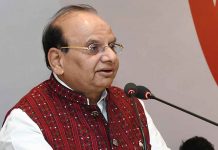Edited Excerpts from an interview •

Tell us about some of Navrasa Duende’s events in India in the recent past. What has the response been like?
Producing ‘Swan Lake’ was a delightful and overwhelming experience for us. Despite ballet being a relatively lesser known performing art in India, both the productions received a phenomenal response. We had maximum sold-out shows during the first production in September 2017 in New Delhi as well as the multi-city tour across Mumbai, New Delhi, Kolkata and Ahmedabad this year. The Royal Russian Ballet’s troupe of 46 extremely talented artistes performed the classic ballet, which was choreographed by Vladimir Troschenko and directed by Anatoliy Kazatskiy. Both productions had different sets of leads playing Odette/Odile and Prince Siegfried, and all of their performances were equally loved by the audiences. The production is the most successful western classical theatrical experience ever staged in India till date. By now, over 50,000 persons have enjoyed the show and we are getting requests from all major cities to stage the production.
The World Classic Movie Festival was our second event (after ‘My Journey’, an intimate evening with Pandit Jasraj), and our first event on cinema. The idea behind the festival was to offer Indian audiences a glimpse into classic world cinema. We chose two directors from the classic age of Hollywood, Alfred Hitchcock and Frank Capra, and showcased two of the best known works of each. The event was met with much enthusiasm from audiences of all ages who expressed their appreciation for the opportunity to watch films like these on a big screen. The second edition of the festival held this year in June, was based on the theme of World Classic. It featured nine films from across several countries like India, Japan, Sweden, Russia, Italy, the US, UK and France, by directors such as Satyajit Ray, Akira Kurosawa, Ingmar Bergman, Andrei Tarkovsky, Victor Fleming, Marcel Carne, Norman Jewison and David Lean. This year’s festival got an even better response with near houseful screenings across all three days. Besides Turner Classic Movies, this is a one-of-its-kind movie festival in the world.
Please share details of some of the upcoming events and their highlights that Indian audiences can look forward to.
As part of the ongoing collaboration with the Royal Russian Ballet, we have two productions on the floor — ‘Romeo and Juliet’ and ‘Nutcracker.’ ‘Romeo and Juliet’ is a much-loved play and the love story will be a unique treat for art enthusiasts — something that audiences have never seen before. The ballet has been composed by Russian composer Sergei Prokofiev, and is not only one of most celebrated ballets, but also one of the most frequently performed ballets across the world. Audiences can expect a thrilling live experience full of powerful music and performances in the ballet format.
Tell us about Navrasa Duende’s plan to launch its own theatre production, R K Lakshman’s Common Man, and the political satire it will feature.
For our first in-house theatre production, R K Laxman’s Common Man goes ‘Right to the Centre’ — a social and political satire that will be written, produced and directed in-house. The play picks up social and political themes from across the globe to draw humour and satire which can find relevance in any part of the world. ‘RK Laxman’s Common
Man’ can be relevant in any political or social milieu.
The play uses a unique fusion of cartooning, ballet, opera and cinematic techniques in a way that has never been used before.
The production is expected to appeal to the mature theatre audience across the globe and is likely to be staged in multiple cities of India, the US, UK and other countries.
The play will be a befitting tribute to RK Laxman’s common man, and his innocent but most lethal and sharp witticism and astute social and political commentary, which his endless admirers (including those he cartooned). Several people will be able to identify with it, and it will revive his memories globally in a big way too.
In what way has Navrasa Duende been strengthening cultural relations between nations by promoting the arts and entertaining audiences through its carnivals and festivals?
A blend of the east and the west is the underlining theme for most of our events as we collaborate with international entertainment companies to offer audiences an authentic experience of engaging with global arts. Not only do we help bring arts and artists from across the globe to India, but also promote India’s art and culture among international audiences. We are doing this through events encompassing diverse media like cinema, music, theatre, and even visual arts like cartooning.
Are classical dance forms gaining more relevance over contemporary dance forms with the help of live entertainment platforms? Tell our readers more about this.
The classical art forms including dance is a part of every country’s tradition and remain a source of inspiration for contemporary dance forms. Most theatrical commercial successes use the right blend of classical forms, modern techniques and narrative to take it across a wider audience.
There is an audience out there for both, but there is a vast difference in how they are engaged by entertainment companies or event organisers. While contemporary dance-based events target larger audiences, classical dance or musical events have a more niche appeal and there have not been any drastic changes in this scenario. However, live entertainment platforms are gradually helping to take classical dance to the mainstream by properly scaling up production values or experimental elements and effective advertisement campaigns.
Are international companies increasingly seeing more opportunities in the Indian entertainment industry?
As urban audiences are increasingly exposed to global entertainment, India has seen a growth of live entertainment shows and festivals produced by international companies over the years. Such events not only bring international artists to the country, but also draw audiences from across India as well as other parts of the world.
The presence of international entertainment companies is becoming more prominent in the digital space and in film production. Global giants like Disney and Netflix, for instance, have invested heavily into the Indian entertainment industry, which only goes to show the massive potential that the market has.
However, the Indian live entertainment industry has to go long way to achieve international standards in terms of scale, logistics, content and discipline. Government support to grant industry status to live entertainment will enable it to have proper business or finance plans.
letters@tehelka.com












